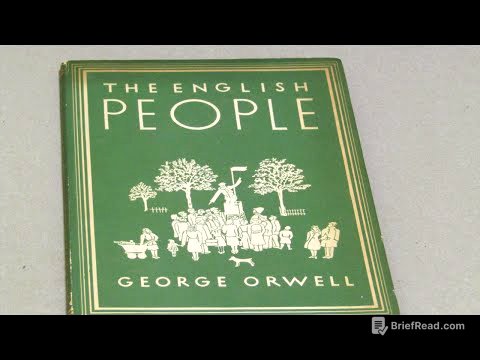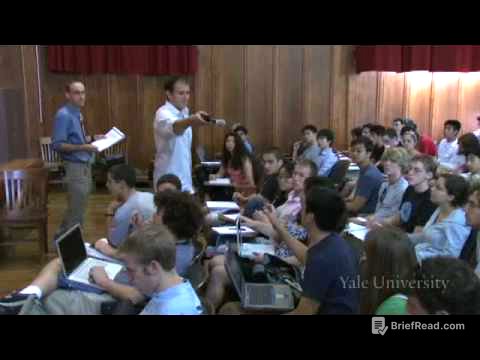TLDR;
This video addresses common misconceptions and superstitions prevalent in society that link certain everyday actions to poverty or misfortune. The speaker clarifies the Islamic perspective on these beliefs, distinguishing between actions that are against Sunnah (Prophet Muhammad's practices), manners, cleanliness, and those that are simply baseless superstitions. The video aims to dispel ignorance and promote a more rational understanding of Islamic teachings.
- Sleeping too much doesn't cause poverty, but neglecting prayers does.
- Many beliefs about daily activities bringing poverty are baseless superstitions.
- Actions against cleanliness, manners, and Sunnah should be avoided.
Introduction [0:00]
The speaker introduces the topic of common beliefs and rumors that certain actions lead to poverty. These beliefs are widespread in society and often found in books and on social media. The speaker aims to clarify these misconceptions by explaining which actions are against cleanliness, Sunnah, and general etiquette, and which are simply unfounded superstitions.
Sleeping Too Much [1:32]
Sleeping excessively does not inherently cause poverty. However, if it leads to neglecting prayers (namaz), which is a significant sin, it can have negative consequences. Missing prayers can lead to various problems in this world and the afterlife, weakening one's faith. Sleeping more during vacation or holidays is acceptable as long as prayers are not missed. The key is to balance rest with responsibilities and not neglect religious obligations.
Sleeping Bare Head [2:24]
The idea that sleeping without covering one's head brings poverty is incorrect. There is no religious basis for this belief. It is acceptable to sleep with an uncovered head. Poverty has nothing to do with it.
Urinating While Standing [2:51]
Urinating while standing is against etiquette, civility, shame, and modesty. While it doesn't directly cause poverty, it is an inappropriate act, especially in public, where it can offend others. The Prophet Muhammad (peace be upon him) emphasized the importance of modesty, and this action contradicts that teaching.
Being Lazy in Prayer [3:27]
Being lazy in performing prayers is a significant sin. The Quran contains strict warnings against those who are lazy in their prayers. Such laziness can lead to ruin and destruction.
Calling Parents by Their Names [3:52]
Calling parents by their first names is against etiquette and respect. While it doesn't cause poverty, it is inappropriate and disrespectful. Parents should be addressed with love and respect, not in a rude or dismissive manner.
Doing Wudu in the Toilet [4:20]
Performing wudu (ablution) in a toilet or attached toilet bathroom is permissible and does not lead to poverty. With modern attached toilet bathrooms, it is common to perform wudu there. However, it is essential to keep the toilet and bathroom clean. Cleanliness should be maintained in all areas, including the toilet, bathroom, room, and on one's body.
Leaving Food and Drinks on the Dastarkhwan [5:08]
Leaving food and drinks on the dastarkhwan (tablecloth) is against the Sunnah. If food falls, it should be picked up and eaten. While this doesn't directly cause poverty, consistently acting against the Sunnah can lead to a lack of blessings (Nusat) in the house.
Burning the Peels of Onion and Garlic [5:27]
Burning onion and garlic peels, typically in stoves, has no connection to poverty or misfortune. It is a harmless practice.
Using a Cloth as a Broom [5:46]
Using a cloth to wipe or clean, such as in the kitchen, is acceptable and does not affect blessings. It is not necessary to only use a broom for cleaning.
Sweeping at Night [6:05]
Sweeping the floor at night is permissible and does not bring bad luck. If there is a need to sweep due to dirt or a mess, it should be done regardless of the time.
Sewing Worn Clothes [6:30]
Sewing torn clothes does not cause poverty. It is perfectly acceptable to mend clothes that have been worn. Taking off the clothes for sewing is better to avoid injury.
Wiping the Face with the Clothes One is Wearing [6:59]
Wiping the face with the clothes one is wearing, like kurta sleeves, does not cause poverty. While it may not be the most elegant method, it is acceptable when necessary.
Spider Webs Inside the House [7:20]
Spider webs in the house indicate a lack of cleanliness but do not cause poverty. Maintaining cleanliness is essential, and regular cleaning prevents spider webs.
Sitting on a Pillow [7:38]
Sitting on a pillow that is typically used for the head is against etiquette because it is considered disrespectful to sit on something where the head is placed. However, it does not cause poverty. Using retired pillows for sitting is acceptable.
Eating Bread by Cutting It with Your Teeth [8:03]
Eating bread by biting it with your teeth is not related to blessings or poverty. While it is more elegant to break bread into morsels and eat them, biting into bread, especially for items like burgers or rolls, is acceptable.
Saying Bad Things to Children [9:22]
It is prohibited in Shariat (Islamic law) to say bad things to children. Parents should avoid using harsh or negative language towards their children.
Being Ungrateful and Complaining [9:30]
Constantly complaining and being ungrateful for Allah's blessings can lead to hardship in the house. Being thankful to Allah increases blessings, while ungratefulness can cause them to be taken away.
Using a Broken Comb [10:07]
Using a broken comb or cup does not cause poverty. While it is preferable to use new items if one can afford them, a poor person using broken items will not experience a lack of blessings.
Wearing Clothes While Standing [10:50]
Wearing clothes while standing is discouraged in the Hadith. It is recommended to change clothes while sitting.
Eating in the Dark [11:03]
Eating in the dark is not advisable. It is better to have some light to see the food and ensure cleanliness. However, it does not cause poverty.
Eating Food in Impurity [11:17]
Eating food in a state of impurity (Janabaat) does not cause poverty. While it is preferable to be in a state of cleanliness, it is not always possible, and eating in such a state is permissible.
Slippers Lying Upside Down [11:47]
Slippers lying upside down in the house do not bring bad luck. However, it is against manners and etiquette to leave slippers in disarray.
Keeping the Broom Upright [12:06]
Keeping the broom upright has no negative consequences. It is a matter of personal preference whether to keep the broom standing or lying down.
Conclusion [12:47]
The speaker concludes by emphasizing the importance of differentiating between actions that are against the Sunnah, etiquette, and cleanliness, and those that are simply baseless superstitions. The video aims to help viewers avoid ignorant beliefs and practices prevalent on social media and in society. The speaker encourages viewers to share the video to spread awareness.









